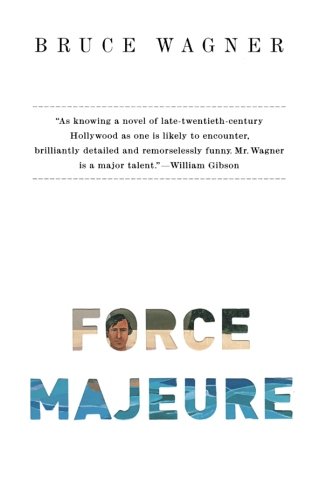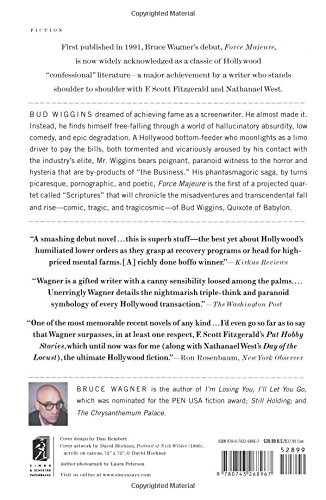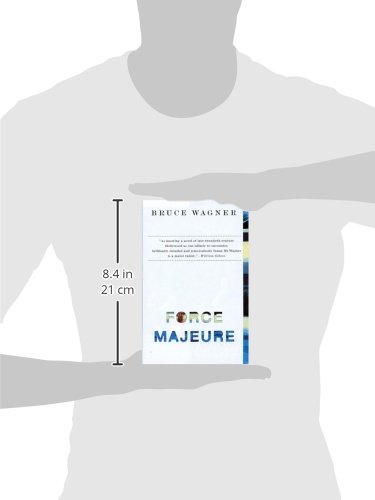معلومات عنا
دعم العملاء
احصل على التطبيق

قم بتوجيه الكاميرا لتنزيل التطبيق
حقوق الطبع والنشر © 2024 Desertcart Holdings Limited




Full description not available
Y**E
Excellent Story Teller
I'm an avid reader so it's an unusual sentiment, however, I love his stories but the writing style makes me yearn to see it on film instead of reading it. Go ahead... Judge Away!
@**N
Deep Portrait of the struggles of a struggling screenwriter
This book goes deep into its character and Hollywood and keeps winding, twisting, turning, down a tunnel that I was so hopeful would turn out well for the flawed, hard working, and redeemable protagonist.
B**E
Excellent Book About The Movie Biz
One of the best books about the inside goings on of modern Hollywood. It was a treat to re-read on Kindle.
T**S
A wicked, and wickedly funny, dark satire of Hollywood
Oh, vital, frenetic wackiness! This book is full of crackling humor, killer lines, and loony situations, all riding on an undercurrent of dark bile. This is less a novel than a series of short stories, which I think it may have been at one time, before the author became well-known, and wrote a TV mini-series (the weird and unappealing “Wild Palms”). It follows the adventures of Bud Wiggins, a struggling, floundering, would-be Hollywood screenwriter. Bud is a piece of work, but he seems like a reasonable fellow in comparison with the people and situations he comes up against.This is without question a satirical portrait of Hollywood and its denizens, from the eager up and comers (like Bud) to the established stars, who are usually some combination of corrupt, half-crazy, or worse, and pretentious. Meet studio head Joseph Harmon, an industry legend, who is given to picking up strange men and giving them oral sex. Then there is Caitlin Wurtz, super-successful screenwriter of “Banana Republic” starring the monkey Calabash, a total kook who takes a liking to the protagonist. Or tough-guy producer Lou Gottlieb who befriends the writer Perry Bravo (recently released from prison, and apparently based on Jack Henry Abbott), a move that costs him his life. The reader also encounters European art house director Witold Kracz, a mental patient who directs the institution’s therapeutic play (written by Bud).The book is episodic in structure, and Bud lurches from one weird situation to the next. He lives with his mom, who is given to some very odd behavior, and mostly makes his living driving a limousine, a job which allows him to eavesdrop on agents and producers whom he is hoping will produce work. This is unlikely to happen, because Bud is a pretty bad writer, given to pursuing stupid, unpleasant ideas that give the author another opportunity for some fine satire. A series of girlfriends passes through Bud’s life, each relationship more unstable than the last, although Bud occasionally seems to be moved deeply by them. He thinks back on two men he was close to who both came to sad ends: his father Moe, an entertainment executive, and his buddy Brian, a drug-abusing physician. He daydreams sentimentally of the happy days of his childhood in a neighborhood called The Arbor.Despite his best efforts, Bud is, in reality, going nowhere fast. He had a brief shot at success early on, but it did not work out, and he keeps trying to get over the walls of the citadel. Success in “Force Majeure” is Fitzgerald’s bitch goddess – she bestows her favors on some, but those blessed are likely to go crazy or suffer some other form of destruction. In the end we see that Bud is more than just unlucky, he is also a jerk who is prone to self-destructive flame-outs (and worse). “Force Majeure” is a bent, wicked, and wickedly funny satire – and I did not even mention a fraction of the crazy tales in here, such as that of supposed rabbi Israel Levi.
S**R
The locusts are here to stay
Bruce Wagner is a screenwriter and director with a swirling disturbing perception of the subworld that is Hollywoodland. When writing the seminal though hardly remembered techrevolution packaged as a TV miniseries, Wild Palms, he locked himself away in the old 20s glamour haunt, the Chateau Marmont friend William Gibson has reported, and filled the room with books - not to read, but just to inspire or invoke in the darn thing. I think there were probably a lot of candles too.Force Majeure is somewhat more contemporary than the near future world of Wild Palms, but it is spilling over with the same mundane paranoia that seeps through Hollywood. Bud Wiggins, a Willy Loman as screenwriter bumps and stumbles through a world and narrative that is part Day of the Locusts, part Terry Southern's Blue Movie. You feel like there's always a conspiracy around the corner, but its only showbiz. Force Majeure whips together trippyness, struggle, pop, and pornography in a way that makes me think of Leonard Cohen's Beautiful Losers, though the books are not similar otherwise.Finally, this is a portrait of Hollywood. There's a beginning rule of screenwriting that says Hollywood is the only place where you can make a living on failure. And that's if you're really lucky. Force Majeure embodies that notion.
S**O
Overrated and solipsistic
I bought this book on the recommendation of a friend and found it profoundly dissapointing. The most annoying thing about it is the way that the plot is packed with red herrings: mysterious, unnamed characters who seem to be crucial but never develop into anybody interesting or meaningful and instead just vanish; sub-plots that end suddenly and uninterestingly, as though the writer forgot where he was going and decided to change direction mid-stream; and tons of fascinating "minor" characters who are either conveniently knocked off or commit suicide before they risk stealing the scene from the stunningly boring, self-indulgent, predictable narrator. Wagner tries to get away with this by referencing "Don Quixote," a novel famous for its rambling, meandering, tangential, apparently endless narrative. This unbelievably egocentric comparison might work for some but I stopped reading "Don Quixote" long before that book ended and I was tempted to do the same with this one.I thought this would be a "fun romp" through Hollywood, with lots of name-dropping, gossipy, juicy stuff, but the truth is it is way too ambitious--trying to be a combination of Philip Roth and Cervantes. Okay, yes, it is his first, but unfortunately it will, for me anyway, be the last Wagner I ever pick up.
ترست بايلوت
منذ 4 أيام
منذ يوم واحد